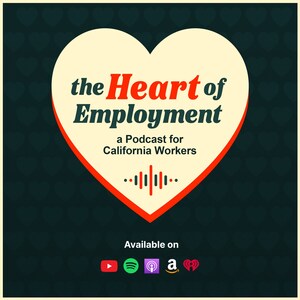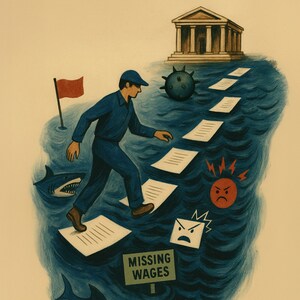
By Loreni Yeterian, Associate Attorney, D.Law
LOS ANGELES, Sept. 23, 2025 /PRNewswire/ -- What happens when your next job interview, promotion review, or even termination isn't decided by a human being?
That's the growing reality for California workers.
In response, The Golden State is taking a bold stance with a first-in-the-nation legislative proposal called the "No Robo Bosses Act." Senate Bill 7, released in March, aims to regulate the increasing use of artificial intelligence and automated systems in employment decision-making.
As an employment law attorney dedicated to protecting the rights of workers, I believe it's critical for employees and employers alike to understand how this legislation could alter the workplace landscape in California.
What Is the "No Robo Bosses" Act?
The "No Robo Bosses Act" is designed to prevent employers from relying on automated tools to make or influence employment decisions, without oversight, consent, or fairness.
This isn't just about technology. It's about accountability, transparency, and human dignity in the face of automation. It's a direct response to growing concerns about biased algorithms, opaque AI tools, and the lack of recourse for workers impacted by automated decision-making.
Under this proposed law, employers who use AI or other "automated decision systems" in their hiring, firing, promotion, or performance evaluation processes would face new obligations and restrictions.
Let's break it down.
1. Transparency: Employees Deserve to Know When AI Is Involved
One of the key features of the bill is mandatory notice. Employers would be required to disclose when they're using an automated system to make or influence employment decisions. This includes systems that screen resumes, analyze video interviews, or generate performance ratings.
Why does this matter? Because many workers don't even realize that a machine, not a person, is deciding their fate. Without transparency, employees can't challenge unfair decisions or identify discrimination baked into the algorithm.
As a lawyer, I've seen how lack of disclosure undermines employee rights. This bill gives workers a basic but powerful tool: the right to know.
2. Accountability: Bias Isn't Just a Human Problem
AI is only as fair as the data and assumptions it's built on, and history shows that can be a real problem.
Automated systems have been found to amplify racial, gender, and age biases, sometimes in subtle but devastating ways. One high-profile example? A resume-screening algorithm that downgraded applicants who attended women's colleges or had gaps in employment history (often related to caregiving).
The "No Robo Bosses Act" would require employers to actively monitor and assess these tools for discriminatory outcomes and take steps to mitigate harm. If they fail to do so, they could face legal liability.
The law sends a clear message: You can't outsource discrimination to a robot and expect to get away with it.
3. Consent and Human Oversight: Real People Should Still Have the Final Say
Perhaps the most worker-empowering element of the bill is that automated tools cannot be used as the sole factor in any employment decision. There must be meaningful human involvement, someone who can explain the decision, exercise discretion, and be held accountable.
This is about preserving basic fairness. No worker should be fired, rejected, or demoted based solely on a black-box algorithm with no opportunity for review.
We've already seen automated firings at leading companies. The "No Robo Bosses Act" would push back on this faceless approach to management and ensure employees retain access to due process.
What This Means for Workers in California
If passed, the "No Robo Bosses" Act would be the most progressive law of its kind in the United States, and perhaps globally. It offers a first line of defense for workers who are already being swept into the AI revolution without a say.
For employees, this law would provide:
- Clear notification when AI tools are being used.
- The right to challenge decisions that appear biased or erroneous.
- Legal recourse if AI tools are used in a way that leads to discrimination.
And perhaps most importantly, it reaffirms that people, not algorithms, should be at the center of workplace decisions.
Why I Believe This Bill Matters
Technology is changing the workplace faster than the law can keep up.
But progress doesn't have to mean unchecked power for employers and opacity for employees. We can, and should, create a future of work that harnesses the potential of AI while safeguarding civil rights, dignity, and fairness.
The "No Robo Bosses Act" is an opportunity to do just that.
As a lawyer who has been defending employees against unfair treatment, I believe this bill reflects a much-needed shift in the legal conversation, from "what can AI do?" to "what should AI be allowed to do when people's livelihoods are on the line?"
Final Thoughts
The rise of AI in the workplace isn't hypothetical, it's happening now.
California's "No Robo Bosses" Act is a powerful acknowledgment that worker protections must evolve alongside technology.
This bill may still be making its way through the legislative process, but its message is clear: Workers are not data points, and employment decisions shouldn't be reduced to math formulas.
If you're an employee in California, keep an eye on this legislation. And if your employer is already using AI tools in ways that affect your job, now is the time to start asking questions and demanding answers.
Contact D.Law by calling (818) 875-2008 or send a message with any questions or concerns you may have regarding your employment rights. Our attorneys are experts in California employment law and worker's rights and can help you with the problems you are faced with.
Contact: Armen Petrosyan, [email protected]
SOURCE D.Law, Inc.








Share this article